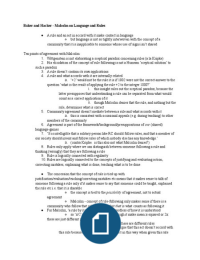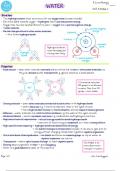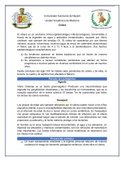Baker and Hacker - Malcolm on Language and Rules
● A rule and an act in accord with it make contact in language
○ but language is not so tightly interwoven with the concept of a
community that it is inapplicable to someone whose use of signs isn’t shared
Ten points of agreement with Malcolm:
1. Wittgenstein is not elaborating a sceptical paradox concerning rules (a la Kripke)
2. His elicidation of the concept of rule following is not a Humean ‘sceptical solution’ to
such a paradox
3. A rule doesn’t contain its own applications
4. A rule and what accords with it are internally related
a. ‘+2’ would not be the rule it is if 1002 were not the correct answer to the
question ‘what is the result of applying the rule +2 to the integer 1000?’
i. this insight rules out the sceptical paradox, because the
latter presupposes that understanding a rule can be separated from what would
count as a correct application of it
ii. though Malcolm denies that the rule, and nothing but the
rule, determines what is correct
5. Community agreement doesn’t mediate between a rule and what accords with it
a. this is consistent with occasional appeals (e.g. during teaching) to other
members of the community
6. Agreement is part of the framework/background/presuppositions of our (shared)
language-games
7. ‘It is intelligible that a solitary person like RC should follow rules, and that a member of
our society should invent and follow rules of which nobody else has any knowledge.’
a. (contra Kripke. is this also not what Malcolm denies?)
8. Rules only apply where we can distinguish between someone following a rule and
thinking (wrongly) that they are following a rule
9. Rule is logically connected with regularity
10. Rules are logically connected to the concepts of justifying and evaluating action,
correcting mistakes, explaining what is done, teaching what is to be done
● The concession that the concept of rule is tied up with
justification/evaluation/teaching/correcting mistakes etc means that it makes sense to talk of
someone following a rule only if it makes sense to say that someone could be taught, explained
the rule etc i.e. that it is sharable
○ the concept is tied to the possibility of agreement, not to actual
agreement
○ Malcolm - concept of rule-following only makes sense if there is a
community who follow that rule and agree that that is what counts as following it
● For Malcolm, ‘a rule by itself’ means a sign, regardless of how it is understood
○ so ‘x!2’ is the same rule, even though it make mean x-squared or 2x:
these are just different projections
■ for Baker/Hacker, these are different rules
■ it is a mistake to argue that this act doesn’t accord with
this rule because most people would not act in this way when given this rule
, ● correct should not be defined in terms of
agreement
● Without practices that use signs as standards of correctness, there are no rules.
○ so the disagreement is over the practice which constitutes the
presupposition of the existence of the rule: must it be shared, or can it be unshared (but
shareable)?
● Malcolm denies that if a rule is given, then so is its extension
○ but if the intension of ‘even integer’ is given, then so is its extension,
though the intension neither is nor contains the extension
■ to understand a rule is to understand its application
■ it is only a rule if it is used as a standard of correctness
i.e. is manifested in a practice
● hence again the question, what kind of
practice? shared/shareable?
● Malcolm quotes Wittgenstein as if to suggest that his comments about the relation
between agreement and language stand for language simpliciter, rather than just shared language
○ in fact they are placed in a context of explicit discussion of shared
language
● The questions regarding solitary language users are:
○ can a forever solitary individual use a language?
○ is it intelligible that non-solitary individuals might each use only
unshared languages?
■ Malcolm claims that Wittgenstein never entertains this
possibility, but he does - he says ‘there can be human beings who are acquainted
only with language-games which one plays by oneself’
● For W, ‘the genesis of a linguistic ability is irrelevant to its identification...the criteria for
mastery of a technique lie in its exercise in appropriate circumstances’
○ the question of genesis is an empirical question - there is nothing
logically objectionable in the idea of innate mastery of a language
■ the criteria for whether it is a language make no
reference to what people in London did twenty years ago (for the real Crusoe),
hence it does not matter whether we talk of Defoe’s Crusoe or a RC
● ‘One can no more engage in commerce alone on a desert island than one can get married
or fight a duel in solitude. But one can certainly follow rules, play patience or keep a diary in
solitide’
○ (question begging? perhaps not, if genesis doesn’t matter)
● Justification, explanation, instruction, correction etc. only matter if asked - a RC hasn’t
had the opportunity to justify, explain etc
○ Crusoe can correct himself, could explain to others ‘what he is up to’ etc
● If Malcolm accepts that such possible agreement is the criterion of rule-following, but
wishes to claim that this is impossible for a real RC, he must argue that it is only possible to make
rules for oneself if one has first learnt shared rules
○ but this contravenes the grammatical proposition that the criteria for
having an ability lie in present performance, not the original mode of acquisition
● What about the distinction between following a rule and merely thinking that one is
following a rule? Malcolm has to show that this is only valid where rules are shared
○ but if people can follow shared rules, then the distinction must be
● A rule and an act in accord with it make contact in language
○ but language is not so tightly interwoven with the concept of a
community that it is inapplicable to someone whose use of signs isn’t shared
Ten points of agreement with Malcolm:
1. Wittgenstein is not elaborating a sceptical paradox concerning rules (a la Kripke)
2. His elicidation of the concept of rule following is not a Humean ‘sceptical solution’ to
such a paradox
3. A rule doesn’t contain its own applications
4. A rule and what accords with it are internally related
a. ‘+2’ would not be the rule it is if 1002 were not the correct answer to the
question ‘what is the result of applying the rule +2 to the integer 1000?’
i. this insight rules out the sceptical paradox, because the
latter presupposes that understanding a rule can be separated from what would
count as a correct application of it
ii. though Malcolm denies that the rule, and nothing but the
rule, determines what is correct
5. Community agreement doesn’t mediate between a rule and what accords with it
a. this is consistent with occasional appeals (e.g. during teaching) to other
members of the community
6. Agreement is part of the framework/background/presuppositions of our (shared)
language-games
7. ‘It is intelligible that a solitary person like RC should follow rules, and that a member of
our society should invent and follow rules of which nobody else has any knowledge.’
a. (contra Kripke. is this also not what Malcolm denies?)
8. Rules only apply where we can distinguish between someone following a rule and
thinking (wrongly) that they are following a rule
9. Rule is logically connected with regularity
10. Rules are logically connected to the concepts of justifying and evaluating action,
correcting mistakes, explaining what is done, teaching what is to be done
● The concession that the concept of rule is tied up with
justification/evaluation/teaching/correcting mistakes etc means that it makes sense to talk of
someone following a rule only if it makes sense to say that someone could be taught, explained
the rule etc i.e. that it is sharable
○ the concept is tied to the possibility of agreement, not to actual
agreement
○ Malcolm - concept of rule-following only makes sense if there is a
community who follow that rule and agree that that is what counts as following it
● For Malcolm, ‘a rule by itself’ means a sign, regardless of how it is understood
○ so ‘x!2’ is the same rule, even though it make mean x-squared or 2x:
these are just different projections
■ for Baker/Hacker, these are different rules
■ it is a mistake to argue that this act doesn’t accord with
this rule because most people would not act in this way when given this rule
, ● correct should not be defined in terms of
agreement
● Without practices that use signs as standards of correctness, there are no rules.
○ so the disagreement is over the practice which constitutes the
presupposition of the existence of the rule: must it be shared, or can it be unshared (but
shareable)?
● Malcolm denies that if a rule is given, then so is its extension
○ but if the intension of ‘even integer’ is given, then so is its extension,
though the intension neither is nor contains the extension
■ to understand a rule is to understand its application
■ it is only a rule if it is used as a standard of correctness
i.e. is manifested in a practice
● hence again the question, what kind of
practice? shared/shareable?
● Malcolm quotes Wittgenstein as if to suggest that his comments about the relation
between agreement and language stand for language simpliciter, rather than just shared language
○ in fact they are placed in a context of explicit discussion of shared
language
● The questions regarding solitary language users are:
○ can a forever solitary individual use a language?
○ is it intelligible that non-solitary individuals might each use only
unshared languages?
■ Malcolm claims that Wittgenstein never entertains this
possibility, but he does - he says ‘there can be human beings who are acquainted
only with language-games which one plays by oneself’
● For W, ‘the genesis of a linguistic ability is irrelevant to its identification...the criteria for
mastery of a technique lie in its exercise in appropriate circumstances’
○ the question of genesis is an empirical question - there is nothing
logically objectionable in the idea of innate mastery of a language
■ the criteria for whether it is a language make no
reference to what people in London did twenty years ago (for the real Crusoe),
hence it does not matter whether we talk of Defoe’s Crusoe or a RC
● ‘One can no more engage in commerce alone on a desert island than one can get married
or fight a duel in solitude. But one can certainly follow rules, play patience or keep a diary in
solitide’
○ (question begging? perhaps not, if genesis doesn’t matter)
● Justification, explanation, instruction, correction etc. only matter if asked - a RC hasn’t
had the opportunity to justify, explain etc
○ Crusoe can correct himself, could explain to others ‘what he is up to’ etc
● If Malcolm accepts that such possible agreement is the criterion of rule-following, but
wishes to claim that this is impossible for a real RC, he must argue that it is only possible to make
rules for oneself if one has first learnt shared rules
○ but this contravenes the grammatical proposition that the criteria for
having an ability lie in present performance, not the original mode of acquisition
● What about the distinction between following a rule and merely thinking that one is
following a rule? Malcolm has to show that this is only valid where rules are shared
○ but if people can follow shared rules, then the distinction must be











